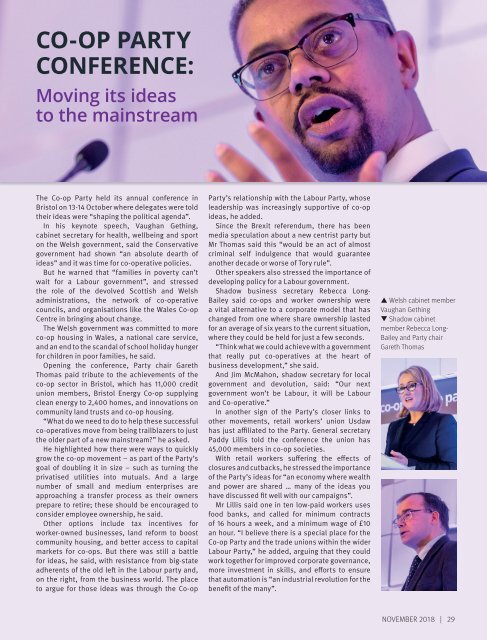NOVEMBER 2018
The November edition of Co-op News looks at co-operation as a remedy - and a safeguard. Plus... how we covered the first world war 100 years ago, reports from co-operative conferences around the world, and our 2018 Christmas gift guide.
The November edition of Co-op News looks at co-operation as a remedy - and a safeguard.
Plus... how we covered the first world war 100 years ago, reports from co-operative conferences around the world, and our 2018 Christmas gift guide.
You also want an ePaper? Increase the reach of your titles
YUMPU automatically turns print PDFs into web optimized ePapers that Google loves.
CO-OP PARTY<br />
CONFERENCE:<br />
Moving its ideas<br />
to the mainstream<br />
The Co-op Party held its annual conference in<br />
Bristol on 13-14 October where delegates were told<br />
their ideas were “shaping the political agenda”.<br />
In his keynote speech, Vaughan Gething,<br />
cabinet secretary for health, wellbeing and sport<br />
on the Welsh government, said the Conservative<br />
government had shown “an absolute dearth of<br />
ideas” and it was time for co-operative policies.<br />
But he warned that “families in poverty can’t<br />
wait for a Labour government”, and stressed<br />
the role of the devolved Scottish and Welsh<br />
administrations, the network of co-operative<br />
councils, and organisations like the Wales Co-op<br />
Centre in bringing about change.<br />
The Welsh government was committed to more<br />
co-op housing in Wales, a national care service,<br />
and an end to the scandal of school holiday hunger<br />
for children in poor families, he said.<br />
Opening the conference, Party chair Gareth<br />
Thomas paid tribute to the achievements of the<br />
co-op sector in Bristol, which has 11,000 credit<br />
union members, Bristol Energy Co-op supplying<br />
clean energy to 2,400 homes, and innovations on<br />
community land trusts and co-op housing.<br />
“What do we need to do to help these successful<br />
co-operatives move from being trailblazers to just<br />
the older part of a new mainstream?” he asked.<br />
He highlighted how there were ways to quickly<br />
grow the co-op movement – as part of the Party’s<br />
goal of doubling it in size – such as turning the<br />
privatised utilities into mutuals. And a large<br />
number of small and medium enterprises are<br />
approaching a transfer process as their owners<br />
prepare to retire; these should be encouraged to<br />
consider employee ownership, he said.<br />
Other options include tax incentives for<br />
worker-owned businesses, land reform to boost<br />
community housing, and better access to capital<br />
markets for co-ops. But there was still a battle<br />
for ideas, he said, with resistance from big-state<br />
adherents of the old left in the Labour party and,<br />
on the right, from the business world. The place<br />
to argue for those ideas was through the Co-op<br />
Party’s relationship with the Labour Party, whose<br />
leadership was increasingly supportive of co-op<br />
ideas, he added.<br />
Since the Brexit referendum, there has been<br />
media speculation about a new centrist party but<br />
Mr Thomas said this “would be an act of almost<br />
criminal self indulgence that would guarantee<br />
another decade or worse of Tory rule”.<br />
Other speakers also stressed the importance of<br />
developing policy for a Labour government.<br />
Shadow business secretary Rebecca Long-<br />
Bailey said co-ops and worker ownership were<br />
a vital alternative to a corporate model that has<br />
changed from one where share ownership lasted<br />
for an average of six years to the current situation,<br />
where they could be held for just a few seconds.<br />
“Think what we could achieve with a government<br />
that really put co-operatives at the heart of<br />
business development,” she said.<br />
And Jim McMahon, shadow secretary for local<br />
government and devolution, said: “Our next<br />
government won’t be Labour, it will be Labour<br />
and Co-operative.”<br />
In another sign of the Party’s closer links to<br />
other movements, retail workers’ union Usdaw<br />
has just affiliated to the Party. General secretary<br />
Paddy Lillis told the conference the union has<br />
45,000 members in co-op societies.<br />
With retail workers suffering the effects of<br />
closures and cutbacks, he stressed the importance<br />
of the Party’s ideas for “an economy where wealth<br />
and power are shared … many of the ideas you<br />
have discussed fit well with our campaigns”.<br />
Mr Lillis said one in ten low-paid workers uses<br />
food banks, and called for minimum contracts<br />
of 16 hours a week, and a minimum wage of £10<br />
an hour. “I believe there is a special place for the<br />
Co-op Party and the trade unions within the wider<br />
Labour Party,” he added, arguing that they could<br />
work together for improved corporate governance,<br />
more investment in skills, and efforts to ensure<br />
that automation is “an industrial revolution for the<br />
benefit of the many”.<br />
p Welsh cabinet member<br />
Vaughan Gething<br />
q Shadow cabinet<br />
member Rebecca Long-<br />
Bailey and Party chair<br />
Gareth Thomas<br />
<strong>NOVEMBER</strong> <strong>2018</strong> | 29


















